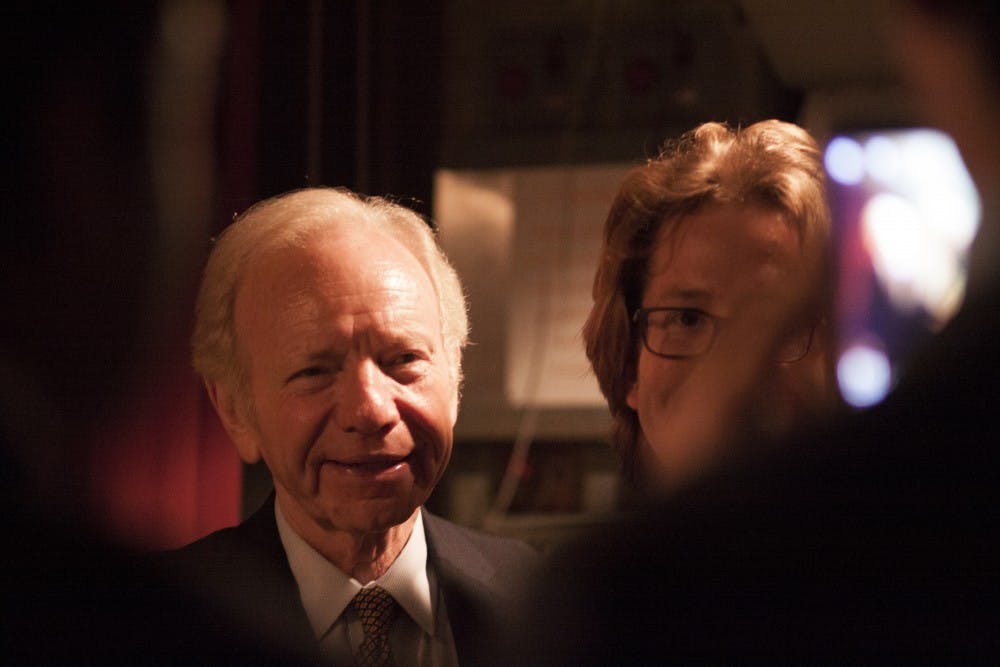By ALEX DRAGONE Senior Staff Writer
Former United States Senator Joseph “Joe” Lieberman spoke in Shriver Hall on Wednesday night as part of the Milton S. Eisenhower Symposium’s (MSE) 2015 lineup. He discussed the 2016 presidential election primaries and the current state of Syria.
Lieberman served ten years as a Democrat in the Connecticut State Senate from 1970 to 1980. He then served as Connecticut’s Attorney General before being elected to the U.S. Senate in 1988.
In 2000, Democratic presidential nominee and former vice president Al Gore chose Lieberman as his vice presidential nominee, making Lieberman the first Jewish American to be on a national ticket. He also ran for the Democratic presidential nomination in 2004, a run which he joked that “nobody remembers, probably fortunately.”
Lieberman lost Connecticut’s Democratic primary for the Senate in 2006 but won in the general election as an Independent.
He continued to serve in the Senate until 2013, when he decided not to run for reelection, saying he wanted to leave government “unescorted.”
Lieberman is now co-chairman of the political advocacy group No Labels, along with former governor of Utah and 2012 Republican presidential candidate Jon Huntsman. No Labels encourages bipartisan solutions at the federal level.
Lieberman explained how Americans perceive candidates and the importance of the election process.

“It is one of the great attributes of our democracy that we don’t take our elected officials too seriously, even in good times,” Lieberman said. “But the truth is that just beneath the healthy skepticism and humor, the American people have always understood that we need government... So when our national government is as dysfunctional as it’s been in recent years, the public becomes not just disappointed and anxious, but ultimately angry.”
Lieberman said that hyper-partisanship is the major cause of gridlock in Washington, D.C., creating a mentality on both sides of the political divide that there can be no compromise with the other side.
Lieberman believes that Americans have turned to presidential candidates, who have little to no previous experience in government, out of frustration.
“In the Republican primary for president, we’ve got three candidates, who are Donald Trump, Ben Carson and Ted Cruz, two of whom who’ve had no experience in government. One, Senator Cruz, who is obviously a senator and member of the government but who really is running as an outside protest candidate,” Lieberman said. “And you put their numbers in the most recent polling together and it’s well over 50 percent. On the Democratic side you’ve got Senator Bernie Sanders who, in his way, is trying to stir a revolution.”
After his speech, Lieberman answered questions. He was asked what he thought was the correct path that the United States should take regarding the Syrian Civil War.
“I think we really botched this one with terrible consequences for the people of Syria and for the whole region,” he said.
During his tenure as a senator, Lieberman was perceived as hawkish on the application of American military might.
Lieberman met with leaders of the anti-Assad coalition when the uprising in Syria began.
“They were not extremists,” Lieberman said. “They were Syrian patriots... We basically stood back. We gave them rhetorical support, but we stood back... This was a misapplication by the Obama administration of the message that the President ran on, that he would be the President who got us out of war, not get us into war.”
Lieberman said that he was worried that radical Islamist groups could use the instability as a way to gain power.
“There emerged an enormous vacuum in Syria which has led to a brutal civil war and has opened up an opportunity for ISIS and other radical group,” he said. “Now we have this totally new factor with the Russians and Putin and the Iranians believing that we and our allies won’t really effectively do anything... I think this is one of the worst foreign policy acts, or in-acts [sic], that America has done, certainly in the modern history of the country... Sorry for the bad news.”
Guillaume Garreau, a postdoctoral student who attended the talk, said he agreed with Lieberman’s views on federal gridlock.
“Basically each party is just voting for the party, and they stop working for the American people,” Garreau said.
Elizabeth Moran, who attended the talk with Garreau, said that she would have pressed Lieberman on some of his views.
“On the one hand, he’s emphasizing the importance of paying down the debt and making a balanced budget, and then goes, ‘Now we need to stop being such wet noodles in foreign policy and invade more.’ At what cost? He didn’t espouse any views,” Moran said. “He was a very good politician.”





